TODAY’S OLD TESTAMENT READING: GENESIS 11-13:4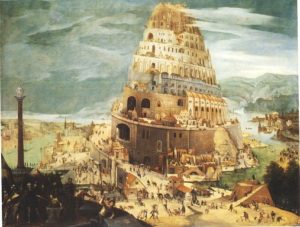
Having been banished because of sin from the Garden of Eden, mankind sets up its counterfeit community outside the presence of God, a civilization East of Eden, called ‘Babylon’. There they created a counterfeit fellowship, a oneness of word, speech, and effort that excluded any interest in the glory of God. The human community declared independence from Creator and His mandates. They attempt to exalt themselves through their own achievements. “Let us build for ourselves a city!” It is their self-made version of Eden.
But Babylon is not God’s garden. It is a city, outside the desired will of God. It is a seedbed for sin to continue to reproduce. The spirit of Babylon is ‘mankind making a name for itself.’ Centuries later Nebuchadnezzar would have his hanging gardens of Babylon, a multi-story structure of imported plants and waterfalls, reputedly one of the seven wonders of the ancient world.
Genesis 11:1-6 (NASB) 1 Now the whole earth used the same language and the same words. 2 It came about as they journeyed east, that they found a plain in the land of Shinar and settled there. 3 They said to one another, “Come, let us make bricks and burn them thoroughly.” And they used brick for stone, and they used tar for mortar. 4 They said, “Come, let us build for ourselves a city, and a tower whose top will reach into heaven, and let us make for ourselves a name, otherwise we will be scattered abroad over the face of the whole earth.” 5 The LORD came down to see the city and the tower which the sons of men had built. 6 The LORD said, “Behold, they are one people, and they all have the same language. And this is what they began to do, and now nothing which they purpose to do will be impossible for them.
Counterfeiting divine fellowship, mankind attempts to consolidate the human community. Rather than the building stones of Eden-they build with the bricks of Babylon. Instead of mortar, they used tar.
Rather than exalting the Name of the Lord, they exalt a Name for themselves. They intend to reach into heaven through self-effort. Adam’s prideful race asserts its energies independently from God.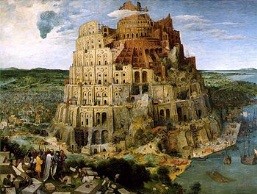
The tower is a symbol for human autonomy. Mankind no longer sees himself as accountable to God, but is out to prove his own worth through his success in living without Him. ‘Babylon’ means ‘gate of the gods’ and it represents the gateway to idolatry.
The spirit of Babylon permeates human society, and will one day come to full expression in the last book of the Bible when it is ultimately destroyed.
REVELATION 18:21 Then a strong angel took up a stone like a great millstone and threw it into the sea, saying, “So will Babylon, the great city, be thrown down with violence, and will not be found any longer.
God’s original plan was that humans should be fruitful and multiply, spreading out into all the world, filling the earth with the knowledge of God’s glory.
Genesis 11:4 shows how the people of the earth were opposed to this plan:
Genesis 11:4 (NASB) 4 They said, “Come, let us build for ourselves a city, and a tower whose top will reach into heaven, and let us make for ourselves a name, otherwise we will be scattered abroad over the face of the whole earth.”
By divine decree, fallen man’s attempts at building unity without reference to the true God are doomed to produce confusion, misunderstanding and failure.
Genesis 11:8 (NASB) 8 So the LORD scattered them abroad from there over the face of the whole earth; and they stopped building the city.
In Mesopotamian mythology, the goddess Nintur calls for humanity to build cities and congregate in one place, demanding that mankind be sedentary rather than nomadic. It is no wonder that when God calls Abram, he is to turn his back on the city and follow God for the rest of his life on a journey of faith. He sought a city “whose builder and maker is God” (Hebrews 11:10; quite the opposite to Babylon!).
Divine intervention causes the confounding of languages and the dispersion of the people groups throughout the earth.
Genesis 11 begins with man setting out to build a great city. It ends with a man turning his back on one. It is the first of many failed social experiments in human history.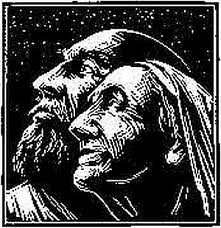
In Genesis 11:27-32 we are introduced to Abram and his wife Sarai.
In Genesis 12 the Lord calls Abram, the son of Terah, an idolater, and tells him to leave his home and relations and walk in a relationship of trust and obedience “to a land I will show you”. The Lord gives Abram a promise to make his descendants a great nation. And through His Seed, prophetically speaking of the nation of Israel, but specifically, Jesus Christ, all the nations of the earth will be blessed.” (Gen 12:3).
This promise is remarkable in many ways. It encompasses not only Abram, but you and me. It is remarkable also because Abram is 75 years old and his wife, Sarai, is barren. The fulfillment of this great promise would be the work of God.
Abram is not perfectly obedient to God, in that his father accompanies him from Ur of the Chaldees, and Lot departs with him from Haran. (He was told to go forth from his relatives and his father’s household.)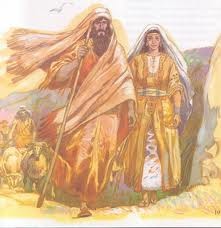
When Abram arrives in Shechem in Canaan, the Lord gives further definition to His original promise. This land of Canaan is to become the possession of Abram’s descendants. Abram builds an altar in Shechem where the LORD appeared to him. Then Abram goes to a mountain between Bethel and Ai and builds another altar where he calls upon the name of the LORD.
(When the Bible uses all capital letters LORD it is a translation of the Hebrew word for the God of Israel, the Covenant Keeping God (YAHWEH). It is a tetragrammaton (a word having four letters) YHWH. With vowel sounds breathed between them, it is pronounced ‘Yahweh’.
During a time of famine, Abram abandons the land he was promised and goes down to Egypt for food. Abram knew that because of Sarai’s beauty she would be treated well. To protect himself he asks Sarai to lie to the authorities and tell them that she is his sister and not his wife. Although Abram was treated well by the Egyptians for her sake, he was now in quite a predicament, and so was Sarai! They would suffer for their dishonesty. Because Pharaoh thought that Sarai was unmarried, he took her into his harem as a wife. The situation was now out of Abram’s control, but not out of God’s. The LORD caused plagues to come upon Pharaoh and his household in order to prompt Pharaoh to release Sarai. Pharaoh realizes that the plagues were caused by the fact that Abram was not being truthful with him. Abram and Sarai are asked to take leave with all their possessions.
In Genesis 13, together with Lot, they return to the Negev and then to the place where he had built an altar between Bethel and Ai. Once again Abram calls upon the name of the LORD.
NEW TESTAMENT READING: MATTHEW 5:1-26
Jesus began his public ministry with a call to repent (to change their way of thinking). They were to repent of their sins and the sin to which we are most often blinded: self-righteousness. They were to repent of thinking that they could be justified (be ‘in the right’) before God through their good works.
Jesus then said, “The kingdom of heaven is at hand.” He was referring to the demonstrable fact that He was a living representative of God’s righteousness.
Jesus then went about all Galilee preaching the gospel of the kingdom of God. This gospel is about the righteousness of God (Romans 1:17). In Christ we have a living portrait of righteousness that is greater than that which was revealed on tables of stone, the law of Moses.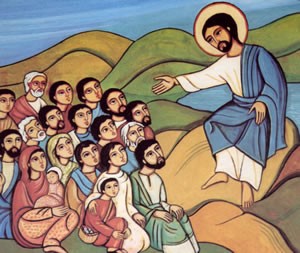
This gospel convicts us of sin. This gospel shows us that we are dead in trespasses and sins. Rather than being subject to the righteous rule of God and walking in the kingdom of light, we are born subject to the ruler of the kingdom of the air, the spirit who is now at work in those who are disobedient and are walking in darkness (Ephesians 2:1-3).
The Sermon on the Mount is an example of Jesus’ preaching of the kingdom of God. The standard of the Kingdom is unreachable for sinners apart from faith in God’s Son, the perfect God-man. Through His provision of perfect atonement for sin on the cross and His own perfect righteousness that He credits to those who believe, we can enter into His kingdom on His merits.
Matthew 5:20 (NIV) 20 For I tell you that unless your righteousness surpasses that of the Pharisees and the teachers of the law, you will certainly not enter the kingdom of heaven.
We cannot live the Sermon on the Mount without Christ’s substitutionary death (that provides for our pardon) and His substitutionary life (that provides for the power to live righteously). For God has made Christ to be for us our wisdom, our righteousness, our sanctification and redemption- (1 Corinthians 1:30).
In the Book of Acts, the Apostle Peter takes up this theme:
Acts 3:19 (NIV) 19 Repent, then, and turn to God, so that your sins may be wiped out, that times of refreshing may come from the Lord,
God designed us with basic hungers. The only hunger that truly satisfies is our God-given hunger for Who Jesus is.
Matthew 5:6 (NIV) 6 Blessed are those who hunger and thirst for righteousness, for they will be filled.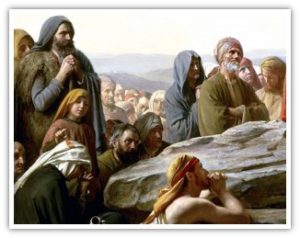
Jesus announces in His Sermon on the Mount that He came to fulfill both the Law (the Torah) and the Prophets (Matthew 5:17-18). He also tells us in these verses that the Law itself was a prophecy to be accomplished and that it would be accomplished in Himself. Jesus was born under the Law to fulfill the law by His righteous living and His substitutionary dying (Galatians 4:4). He redeems those sentenced to death under the law through His death as our substitute on the cross.
Later, on the Mount of Transfiguration, we see that the revelation of the Law and the Prophets are fulfilled in Jesus. This is the testimony of God the Father, with Moses and Elijah as witnesses: “This is my beloved Son in whom I am well pleased. Listen to Him” (Matthew 17:5).
The Gospel of Luke tells us that they were discussing the Greater Exodus, the way of escape, the departure, the death (“exodus in the original Greek text) that He would accomplish in Jerusalem (Luke 19:31). Jesus provides a way for us to escape God’s wrath through His being crucified, buried and raised from the dead on our behalf in Jerusalem (see Luke 9:31).
TODAY’S READING IN THE BOOK OF PSALMS
PSALM 5:1-12
Apart from our Almighty and Holy God receiving us with the evidence of the full payment of our sin debt in the shed blood of Jesus we have no hope of ever surviving an audience with God at the Judgment Seat. We can only come to God in the Name (the merits) of our Lord Jesus Christ. Because of the perfect work of redemption, we are protected by God’s mercy and love and we can worship with deepest awe.
Psalm 5:7 But as for me, by Your abundant lovingkindness I will enter Your house, At Your holy temple I will bow in reverence for You.
So, let us boldly come before the Throne of Grace (Hebrews 4:16).
Psalm 5:1-3 (NASB) 1 Give ear to my words, O LORD, Consider my groaning. 2 Heed the sound of my cry for help, my King and my God, For to You I pray. 3 In the morning, O LORD, You will hear my voice; In the morning I will order my prayer to You and eagerly watch.
TODAY’S READING IN THE BOOK OF PROVERBS- PROVERBS 1:24-28
Proverbs 1:24-28 (NASB) 24 “Because I called and you refused, I stretched out my hand and no one paid attention; 25 And you neglected all my counsel and did not want my reproof; 26 I will also laugh at your calamity; I will mock when your dread comes, 27 When your dread comes like a storm And your calamity comes like a whirlwind, When distress and anguish come upon you. 28 “Then they will call on me, but I will not answer; They will seek me diligently but they will not find me,
PRAYER: Gracious God and Father, Your Word makes plain that there are those who put their trust in Your promises and those who do not. May we not refuse Your outstretched hand, Your counsel, Your correction and reproof. Thank You for sending Your Word who turns the law that condemned us into a promise of a life that fulfills us. Thank You for giving us the Lord Jesus Christ to be our Savior, our Lord and our life. May we not neglect Your commands but trust the sufficiency of Your life to bring forth the obedience that is pleasing to You. Thank You for saving us from our corrupt and hell-bound course. Reproduce Your kingdom life in us by the power of Your Holy Spirit to the degree that we become ‘salting salt’ holding back the spread of corruption, flavoring this world and causing others to thirst after You. IN Jesus’ Name. Amen.
